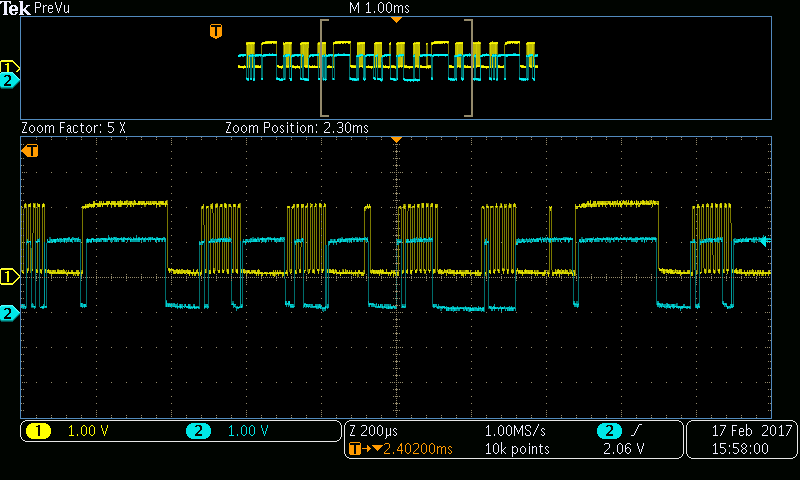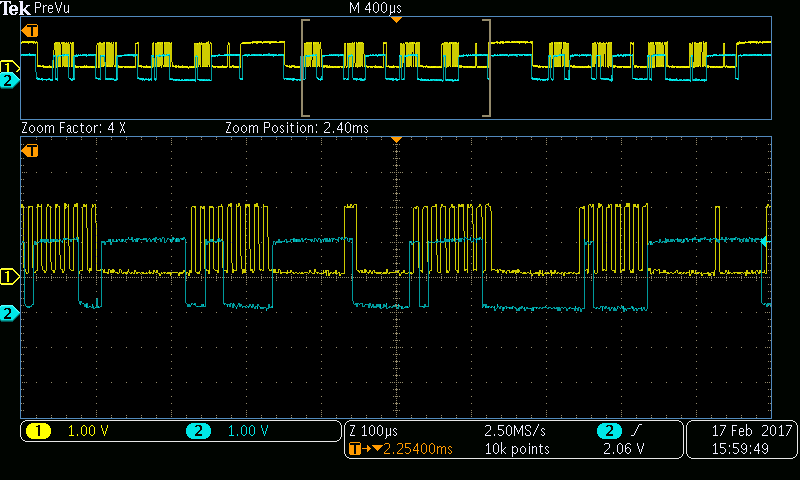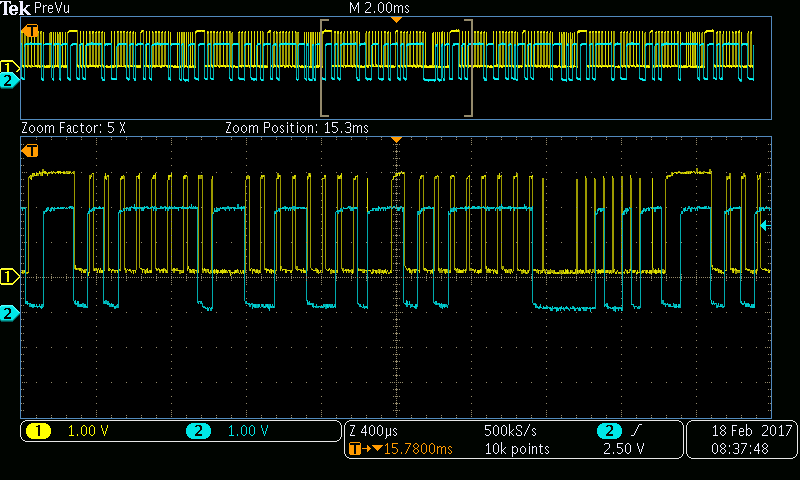Re: HTS221 Humidity and Temperature sensing problem with MikroC and PIC


Hi,
... and now you get data...
Klaus
Yes, with the library from MikroC I can do but I should configure the I2C clock on another pins. I will try again.
@KlausST: Hi Sir, I think I got data, just add delay time after writing a byte.

Which PIC are you using ? If you are not using hardware I2C module then use Soft_I2C library of mikroC.
@Okada: I finished for configuring I2C on two random pins. Cause I used pin C3 and C4 for SPI purpose so I cannot use I2C library from MikroC. Thanks
Yes, i know you can't use I2C1_() library which is hardware I2C library but you can use Soft_I2C_() library which is software I2C library.
@Okada: I will try later. Thanks for your suggestions. That sounds great.
@Okada: your suggestion is really useful for me. Just few minutes to configure and then start, you know the expected results are very good. I can read these values by UART and I will try to read by UHF RFID later.
I have a question, in my case when I try to configure I2C software even though I saw the received on the Oscilloscope but when I read by UART all of the values are 0.
Show the code.
This is my code, I did successfully with I2C library and Soft_I2C library of MikroC.
#define W_SAD 0xBE
#define R_SAD 0xBF
#define SCL TRISB.F1 // I2C bus
#define SDA TRISB.F0 //
#define SCL_IN RB1 //
#define SDA_IN RB0 //
void i2c_dly(void);
void i2c_start(void);
void i2c_stop(void);
void GPIO_Init();
void HTS221_Write(unsigned char CMD);
void HTS221_Init();
void HTS221_Init2();
unsigned char HTS221_uRead(unsigned char CMD);
unsigned char i2c_rx(char ack);
unsigned char HTS221_RD(unsigned char CMD);
void main()
{
unsigned char data0_temp[8], data0_humid[8];
unsigned char ucSensor;
char data1_temp[8], data1_humid[8];
char Temperature[2], Humidity[2];
int H0=0, H1=0, H2=0, H3=0;
int T0=0, T1=0, T2=0, T3=0;
int temp=0, humi=0;
float fTemp=0, fHumidity=0;
int raw=0;
GPIO_Init();
HTS221_Init();
//GPIO_Init2();
//HTS221_Init2();
while(1)
{
//Reading calibration values
//H0_rH_x2 0x30 register address - u8
data0_humid[0] = HTS221_uRead(0x30);
H0 = data0_humid[0]/2;
//H1_rH_x2 0x31 register address - u8
data0_humid[1] = HTS221_uRead(0x31);
H1 = data0_humid[1]/2;
//H0_T0_OUT 0x36 0x37 - s16
data1_humid[0] = HTS221_uRead(0x36); //Lower Byte
data1_humid[1] = HTS221_uRead(0x37); //Higher Byte
H2 = data1_humid[1]*256+data1_humid[0];
//H1_T0_OUT 0x3A 0x3B - s16
data1_humid[2] = HTS221_uRead(0x3A); //Lower Byte
data1_humid[3] = HTS221_uRead(0x3B); //Higher Byte
H3= data1_humid[3]*256+data1_humid[2];
//T0_degC_x8 0x32 register address - u8
data0_temp[0] = HTS221_uRead(0x32);
T0 = data0_temp[0];
//T1_degC_x8 0x33 register address - u8
data0_temp[1] = HTS221_uRead(0x33);
T1 = data0_temp[1];
//T1/T0 msb 0x35 - u2
data0_temp[2] = HTS221_uRead(0x35);
raw = data0_temp[2];
T0 = ((raw & 0x03)*256) + T0;
T1 = ((raw & 0x0C)*64) + T1;
//T0_OUT 0x3C 0x3D - s16
data1_temp[0] = HTS221_uRead(0x3C); //Lower Byte
data1_temp[1] = HTS221_uRead(0x3D); //Higher Byte
T2 = data1_temp[1]*256 + data1_temp[0];
//T1_OUT 0x3E 0x3F - s16
data1_temp[2] = HTS221_uRead(0x3E); //Lower Byte
data1_temp[3] = HTS221_uRead(0x3F); //Higher Byte
T3 = data1_temp[3]*256 + data1_temp[2];
//Reading Humidity and Temperature output
//H_OUT 0x28 0x29 - s16
Humidity[0] = HTS221_uRead(0x28);
Humidity[1] = HTS221_uRead(0x29);
//T_OUT 0x2A 0x2B - s16
Temperature[0] = HTS221_uRead(0x2A);
Temperature[1] = HTS221_uRead(0x2B);
humi = Humidity[1]*256+Humidity[0];
temp = Temperature[1]*256+Temperature[0];
if(temp > 32767)
{
temp-= 65536;
}
fHumidity = ((1.0 * H1) - (1.0 * H0)) * (1.0 * humi - 1.0 * H2) / (1.0 * H3 - 1.0 * H2) + (1.0 * H0);
fTemp = ((T1 - T0) / 8.0) * (temp - T2) / (T3 - T2) + (T0 / 8.0); // Temperature in Celcius
UART1_Write(0xFF);
UART1_Write(0xFF);
UART1_Write(data0_humid[0]);
UART1_Write(data0_humid[1]);
UART1_Write(data1_humid[0]);
UART1_Write(data1_humid[1]);
UART1_Write(Humidity[0]);
UART1_Write(Humidity[1]);
UART1_Write(0xBB);
UART1_Write(0xBB);
}
}
void i2c_dly(void)
{
}
void i2c_start(void)
{
SDA = 1; // i2c start bit sequence
i2c_dly();
SCL = 1;
i2c_dly();
delay_us(80);
SDA = 0;
i2c_dly();
SCL = 0;
}
void i2c_stop(void)
{
SDA = 0; // i2c stop bit sequence
i2c_dly();
SCL = 1;
delay_us(80);
i2c_dly();
SDA = 1;
i2c_dly();
}
void GPIO_Init()
{
ANSELC = 0;
ANSELB = 0;
TRISB = 0;
PORTB = 0;
TRISC = 0;
OSCCON = 0b01011011; //Internal Oscillator 1Mhz
UART1_Init(9600);
delay_ms(300);
}
//Write data to HTS221 based on register address
void HTS221_Write(unsigned char CMD)
{
unsigned char i;
static bit b;
for(i=0; i<8; i++)
{
if(CMD & 0x80)
{
SDA = 1; //SDA = 1 value
}
else
{
SDA = 0; //SDA = 0 value
}
SCL = 1;
i2c_dly();
SCL = 0;
CMD <<= 1;
}
SDA = 1;
SCL = 1;
if(SDA_IN) SDA = 0;
SCL = 0;
while(SDA_IN);
delay_us(50);
}
//I2C read function
unsigned char i2c_rx(char ack)
{
char x;
unsigned char d=0;
SDA = 1;
while(SDA_IN);
for(x=0; x<8; x++) {
d <<= 1;
do {
SCL = 1;
}
while(SCL_IN==0); // wait for any SCL clock stretching
i2c_dly();
if(SDA_IN) d |= 0x01;
SCL = 0;
}
if(ack) SDA = 0;
else SDA = 1;
SCL = 1;
i2c_dly(); // send (N)ACK bit
SCL = 0;
SDA = 1;
delay_us(50);
return d;
}
//Read data from HTS221 based on register address, return unsigned char value
unsigned char HTS221_uRead(unsigned char CMD)
{
unsigned char ucData=0;
int i=0;
i2c_start();
HTS221_Write(W_SAD);
HTS221_Write(CMD);
i2c_start(); //Repeat Start
HTS221_Write(R_SAD);
ucData = i2c_rx(0u);
i2c_stop();
return ucData;
}
//Initialize HTS211 Humidity and Temperature sensor
void HTS221_Init()
{
i2c_start();
HTS221_Write(W_SAD);
HTS221_Write(0x10); //AV_CONF
HTS221_Write(0x1B); //Temperature average samples = 16; Humidity average samples = 32
i2c_stop();
//Configure Active Mode, 1Hz @ODR, not continuous update 0x20
i2c_start();
HTS221_Write(W_SAD);
HTS221_Write(0x20);
HTS221_Write(0x85);
i2c_stop();
}
void HTS221_Init2()
{
I2C1_Start();
I2C1_Wr(W_SAD);
I2C1_Wr(0x10);
I2C1_Wr(0x1B);
I2C1_Stop();
I2C1_Start();
I2C1_Wr(W_SAD);
I2C1_Wr(0x20);
I2C1_Wr(0x85);
I2C1_Stop();
}
//Read value from HTS221
unsigned char HTS221_RD(unsigned char CMD)
{
unsigned char ucData=0;
//For 1st byte
I2C1_Start();
I2C1_Wr(W_SAD);
I2C1_Wr(CMD);
I2C1_Repeated_Start();
I2C1_Wr(R_SAD);
ucData = I2C1_Rd(0);
I2C1_Stop();
}
Were you successful in communicating with the HTS221 ? Did you got the correct temperature and humidity readings ? Did you use Sofy_I2C or Soft_Spi ?
yes, I got the correct temperature and humidity reading using I2C1_() library and Soft_I2C software. They are work well but I mean when I try to configure by myself, it cannot work. I think I'm going to close that topic here.
